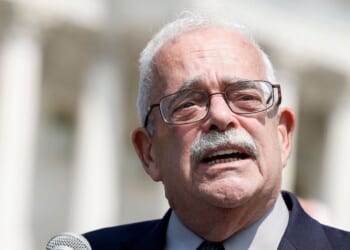The new nuclear energy executive orders, while intending to augment the domestic nuclear energy industry, run the risk of running into trouble within the context of reductions in force that the Trump administration is also implementing.
On Friday, President Donald Trump signed four new executive orders that sought to bolster the US nuclear energy industry by implementing measures to speed up the reactor licensing process, establish additional regulatory pathways (through the US Departments of Energy and Defense) for next-generation nuclear technologies, increase the domestic capacity for test reactors, and strengthen the nuclear fuel cycle and the nuclear workforce.
While most of the directives in the executive orders focused on the domestic policy landscape, the order called “Deploying advanced nuclear reactor technologies for national security” addresses the need for a robust civil nuclear export program. It directs the US Department of State to “actively pursue at least twenty new 123 Agreements by the close of the 120th Congress to enable the United States nuclear industry to access new markets in partner countries” and to “aggressively renegotiate 123 Agreements set to expire within the next decade.”
It also directs the Secretary of Energy to approve or deny export authorization requests within thirty days of receiving complete applications.
Additionally, the new executive order mentions the US International Development Finance Corporation, the US Trade and Development Agency, and the US Export-Import Bank as tools that must be leveraged effectively in order for the US civil nuclear export program to reach its full potential. It also notes that the United States should leverage its “participation in the multilateral development banks to support client country access to financial and technical assistance for the generation and distribution of nuclear energy and a reliable fuel supply,” and that the United States should “promote broad adherence to the Convention on Supplementary Compensation for Nuclear Damage,” which is crucial for building nuclear energy programs in newcomer countries.
All of these measures are critical when it comes to ensuring a strong US civil nuclear export program, and — taken together—they seem to indicate an appreciation for the whole-of-government approach and inter-agency coordination required to compete effectively in the global market.
At the moment, Russia is the primary exporter of nuclear energy technologies globally, and China has announced its intent to surpass Russia. Nuclear energy companies in Russia and China are state-owned enterprises, which means that they are able to offer more competitive state-backed financing packages, as well as a range of other benefits that the United States does not offer (for example, nuclear fuel take-back).
The United States has maintained its foothold in the global nuclear energy market against better-funded geopolitical adversaries primarily because the United States is viewed as a more reliable trading partner than Russia and China, and because US technology is widely seen as being the safest and best. If the Trump administration continues its erratic approach to international trade, especially regarding tariffs, it could easily undercut its own ambitions regarding civil nuclear exports.
Moreover, the independence of the US Nuclear Regulatory Commission (NRC) has long set the global standard for the safe licensing of nuclear reactors. The new executive order “Ordering the reform of the Nuclear Regulatory Commission” puts the independence of the NRC at risk by directing oversight from the Office of Management and Budget and by the Department of Government Efficiency (DOGE), and this jeopardizes the thoroughness of the licensing review process by demanding truncated timelines for the NRC to issue licenses.
All of the measures in the executive orders will be difficult for the government agencies in question to carry out (especially the expedited timelines) within the context of reductions in force that the Trump administration is also implementing. Ultimately, the US civil nuclear export program should receive the types of support outlined in the new executive order, but the Trump administration must support the NRC and its own federal workforce in order to be able to engage effectively with purchasing countries and make the case for US nuclear technologies in the global market.
About the Author: Jennifer T. Gordon
Jennifer T. Gordon is director of the Atlantic Council Global Energy Center’s Nuclear Energy Policy Initiative. Jennifer was previously a senior energy analyst at the National Journal’s Network Science Initiative.
Image: Shutterstock/Castleski

















